Introduction to Collecting Themes
Playing cards can be broadly categorised into standard and non-standard designs, with collectors appreciating their variety.
Above: Contemporary Standard Cards: Q♥ from Waddingtons #1 (left) and USPC Bicycle (right)
In the broadest sense, there are two kinds of cards, standard cards and everything else ‘non-standard’. Standard cards are simply the very familiar designs that have been used for over 600 years for all sorts of games. We will take two journeys – across the globe and back in time…
Early cards were very expensive – card itself and printing were both very new – so almost all early users played for money. Anything unusual is a distraction and a possible source of mistakes. As a result, cards for use in competitive games and gambling have a small range of accepted designs. These are Standard. The modern pattern familiar to us is called English, International or Anglo-American Standard.
Across the world, and we find that different areas have different standard designs. English cards evolved from French, so the French pack is very similar except that the court cards have different figures and the indices are ‘R D V’ (Roi, Dame, Valet). Note also that French Standard court figures have names.

Above: Indian Gangifa: Mir of Surkh (gold coins)1850-75
The cards of Spain and hence South America have Clubs, Coins, Cups and Swords as suits, 12 cards in each suit and a Cavalier instead of a Queen (the card 11 above). Italian Cards vary by region, some with French suits some Spanish, and usually 40 cards in all. German suits are Acorns (above), Bells, Hearts and Leaves. Indian cards – called Ganjifa- are round, beautifully hand painted and come in sets of different sizes, 96 and 120 being common! Japan, China and Iran also have traditional designs.

Above: Illustrated ‘Cries of London’ from c. 1754.
Our second journey is back through time. Early cards are very different. They have square corners and the court cards show full length figures. These were hand-made using wooden blocks to print the outlines and paintbrush and stencils to fill in the colors. Examples are shown below, these are the original English Standard pattern.
Non-standard cards have re-designed faces and may or may not be intended for playing with. The most common types are those where the court cards depict real people or where all the cards are re-drawn by a graphic artist. Illustrated cards were very popular around 1700, where the 52 faces are used as a story board, the full set depicting historic events or capturing other information. Examples include accounts of the Spanish Armada, the Cries of London and the Counties of England and Wales.

Above: Transformation of Goodall cards 19th century, this example is the Fournier Museum facsimile.
Another favorite for collectors are ‘transformation cards’, in which the pips on the numbered cards have been incorporated in a picture in which they look natural (although of course that is rarely possible!). The easy way to ‘get’ the idea is to see some:
So far we have only been concerned with the fronts of the cards. Backs were in fact plain for many centuries – literally unprinted or sometimes a single colour - and gradually became patterned from about 1800.
With improvements in printing, colourful designs became the norm from the 1840s and now they are the main interest for many collectors. The basic artistic back is generally intended to showcase the artist or simply to make the cards more attractive to play with.
Above: Drinks advertising: a collecting theme in itself.
It was not long before card backs were used for promotional purposes too. Collectors nowadays follow categories like films, drinks, cigarettes and airlines.
Above: Travel Souvenirs (…the warmer the better!)
Other special backs are Souvenir and Commemorative. Souvenir cards feature a specific place or event, whereas commemorative cards relate to a date or anniversary. The cards below show some travel souvenirs. Royal births, deaths, cornonations and marriages are another collectible theme.
The Worshipful Company of Makers of Playing-Cards has produced a set of cards every year since 1882 and their backs, all in this commemorative category, recent examples being the Queen’s 60th year as monarch (2013), the centenary of the Christmas truce (2014) and the 800th Lord Mayor’s Parade (2015). This is another very collectible series.
Those wishing to get into more depth can find many resources online, for example here on the ‘World of Playing-cards’ and among books, there are excellent introductions by Sylvia Mann, Rod Starling and others.
References
- Bostock, Paul; Clear the Decks, 52 Plus Joker, Vol. 32, No. 1 (June 2018)
By Paul Bostock
United Kingdom • Member since May 07, 2024 • Contact
Paul has been a collector of playing cards since his early teenage years, the mid 1970s. In the last 20 years or so he has specialised in standard English cards and their story. His collection, including many other English Standards, are featured on his website plainbacks.com. Paul is currently editor of Clear the Decks, the Journal of 52 Plus Joker, the American club for playing card collectors, and is a member of the IPCS Council, an EPCS member and a Past Master of the Worshipful Company of Makers of Playing cards, a City of London livery company.

Leave a Reply
Your Name
Just nowRelated Articles

Royal Mischief Transformation
Royal Mischief Transformation reworks Patrick Valenza’s Royal Mischief characters and imagery...
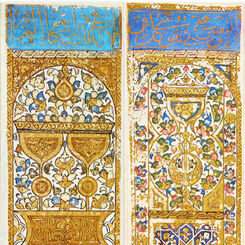
Mamluk Cards and the Making of the European Deck
Mamluk “naib” cards — four suits with named courts — offer a persuasive clue to how playing c...
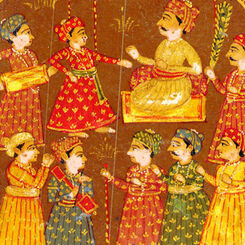
Ganjifa - Playing Cards from India
Indian playing cards, known as Ganjifa, feature intricate designs with twelve suits and are traditio...
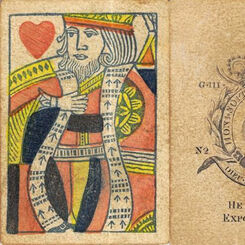
The Henry Hart Puzzle
Explore the intricate history and unique design variations of Henry Hart's playing cards, tracing th...
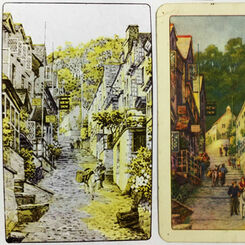
Playing Card Research Archives maintained by The Worshipful Company of Makers of Playing Cards
The Worshipful Company of Makers of Playing Cards maintains an extensive archive of materials from n...
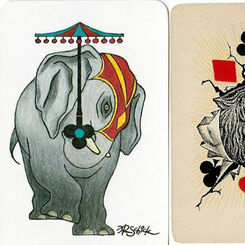
Are Playing Cards a Good Investment?
Playing cards can appreciate modestly, with historical annual gains of 2-3%. Rare cards offer higher...
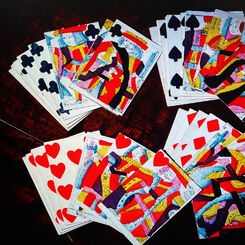
English cards from the reign of Charles II
This article explores a historic pack of English playing cards from circa 1675, likely used by King ...

Why our playing-cards look the way they do
Analysis of early playing card designs: origins, suit differences, standardization, technological ad...
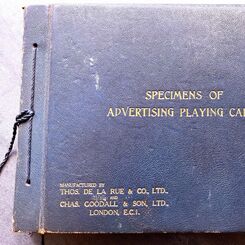
De La Rue 1932-1933 Sample Book of Advertising cards
Complete contents of a sample book of advertising cards by De La Rue
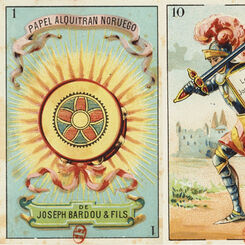
Joseph Bardou & Fils cigarette papers
Delightful pack advertising Joseph Bardou & Fils cigarette papers for the Philippines.
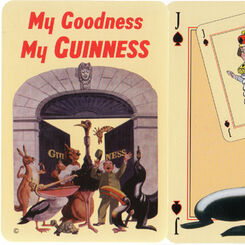
My Goodness my Guinness
Gilroy Special Edition Playing Cards to commemorate the centenary of the birth of John Gilroy, 1989....
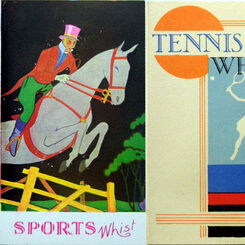
Progressive Whist Cards - page 3
There were various Sports and Sporting Whist themes... and tobacco advertising on score cards.
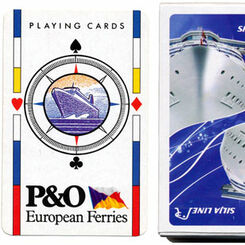
Shipping
A survey of modern Shipping advertising playing cards
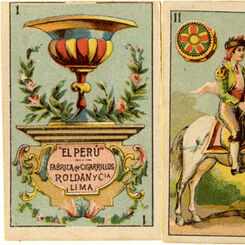
Fabrica de Cigarrillos Roldan y Cia, Lima, Peru
The design of the figures is very agile with excellent colour harmony and execution.
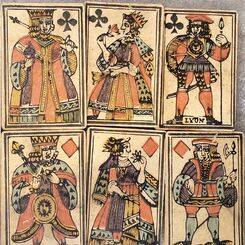
Lyon Pattern type iii
This pattern was used in various parts of eastern France but was ultimately replaced by the official...
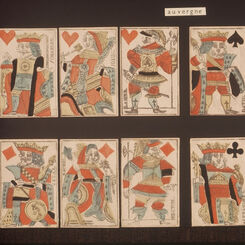
11: Some Cards from Sylvia Mann’s Collection
A fascinating collection that was the basis of a lot of research that we still benefit rom today.
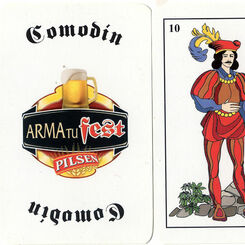
Pilsen Trucofest
Pilsen Trucofest playing cards, Uruguay.
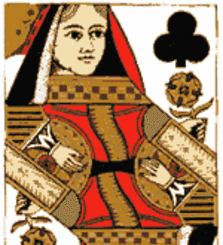
Standard and Non-standard Playing Cards
Standard playing cards are based upon traditional designs and are used for card games.
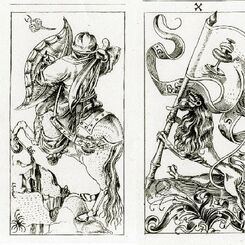
South German Engraver
A pack of 52 cards with banner 10s, female 'Sotas', horsemen and kings, the pack was engraved in the...
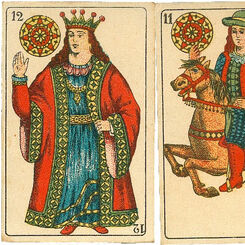
Cigarrillos Compadre, Peru, early 1900s
Spanish-suited playing cards for Cigarrillos Compadre, Peru, early 1900s
Most Popular
Our top articles from the past 60 days












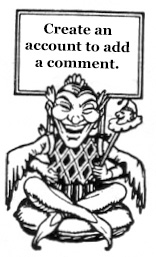 Your comment here. Your comment here. Your comment here. Your comment here. Your comment here. Your comment here. Your comment here. Your comment here. Your comment here. Your comment here. Your comment here. Your comment here. Your comment here. Your comment here. Your comment here. Your comment here. Your comment here. Your comment here. Your comment here. Your comment here. Your comment here. Your comment here. Your comment here. Your comment here. Your comment here. Your comment here. Your comment here. Your comment here. Your comment here. Your comment here. Your comment here. Your comment here.
Your comment here. Your comment here. Your comment here. Your comment here. Your comment here. Your comment here. Your comment here. Your comment here. Your comment here. Your comment here. Your comment here. Your comment here. Your comment here. Your comment here. Your comment here. Your comment here. Your comment here. Your comment here. Your comment here. Your comment here. Your comment here. Your comment here. Your comment here. Your comment here. Your comment here. Your comment here. Your comment here. Your comment here. Your comment here. Your comment here. Your comment here. Your comment here.




















